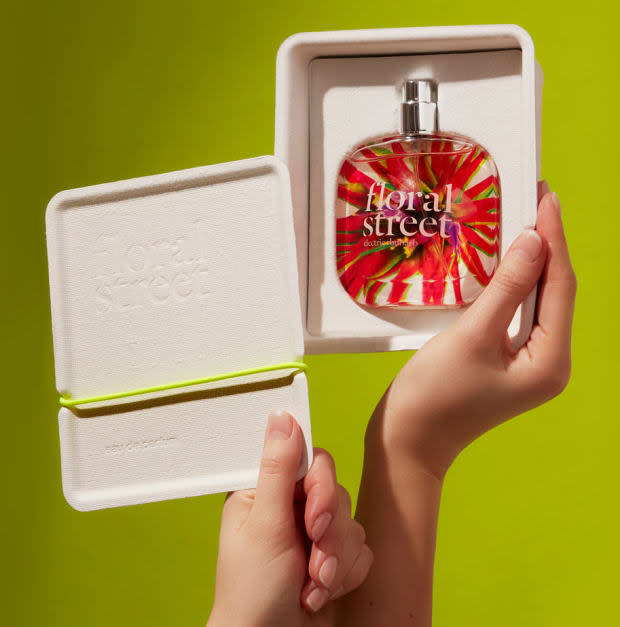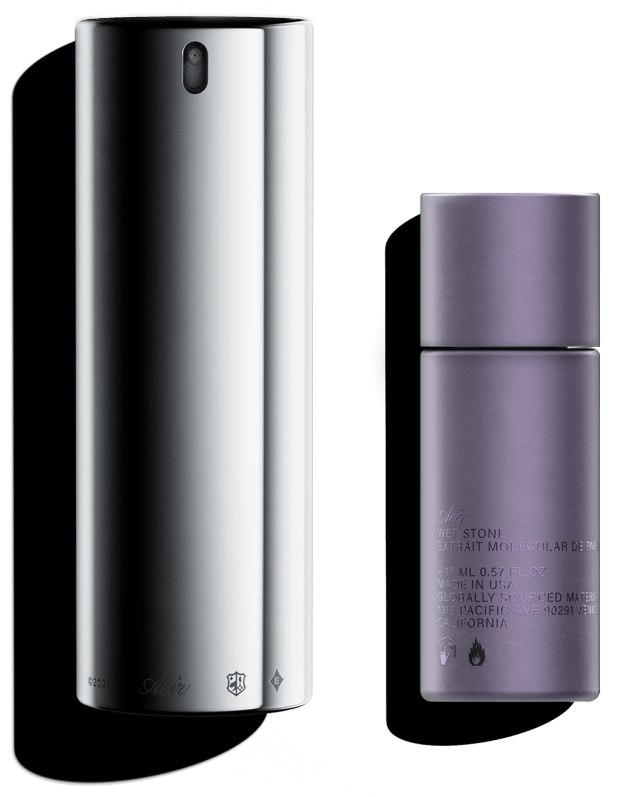Can Any Perfume Brand Make a Truly 'Sustainable' Scent?
As sustainability moves higher up on many consumers' lists of priorities, beauty brands are taking note. For fragrance companies in particular, working toward more sustainable business models and products is a complex process, especially considering ingredient sourcing and the importance of maintaining the luxurious, aspirational ethos to which many perfume brands subscribe. As a result, perfume makers are turning to an array of different tactics in pursuit of more environmentally friendly scents.
Packaging is a hot topic and many brands' first port of call when it comes to improving sustainability credentials. Over the last five years, many major brands including Glossier, Le Labo, Diptyque, Chanel and Jo Malone have introduced refillable options for their fragrances in order to cut back on waste. While this is not something to be sniffed at (get it?), refills are only one part of the packaging picture, and brands are finding new ways to innovate.
Floral Street, the London-based sustainable fragrance brand, was the first to introduce a biodegradable and reusable pulp fragrance box as an alternative to the classic cardboard or plastic box in which bottles are normally housed.
"Using world-first cupcycling technology, we turn used takeaway cups into luxury packaging, giving new life to previously non-recyclable waste," says Michelle Feeney, the company's founder. "With approximately one cup in every 50ml box, we've upcycled around 400,000 to date." While it is relatively easy for a brand to switch to a recycled or recyclable glass bottle, creating plastic-free caps or dispensing systems is more difficult.

Photo: Courtesy of Floral Street
Of course, the liquid itself is just as important as what it comes in (arguably more so) and sourcing ingredients can come with a with a range of issues. While we often equate "sustainable" with "natural" and vice versa, the reality is far more nuanced than that.
"There is a common misconception that synthetics are 'bad' and that natural ingredients are 'good.' However, this is not the case, as naturals aren't always the most sustainable as certain crops such as rosewood are endangered, and some natural ingredients like sandalwood are over-harvested," says Feeney.
Most natural raw ingredients require huge amounts of the flower or plant in question to produce even a tiny bit of the required ingredient. For example, it takes four to five tons (yes, tons) of rose petals to extract just 1kg of rose oil. This, by default, isn't a sustainable use of resources. Therefore, using a mix of responsibly sourced natural ingredients alongside synthetically made ones that can be derived with less waste is often a better option, and it's what Feeney has chosen to do with Floral Street.
For La Bouche Rouge, the luxury French beauty brand that gained fans with its refillable lipsticks, upcycling is a route to tackling the ingredient issue: "We use patented technologies to both recover and upgrade raw material waste from a variety of industries, including perfume, design and food processing," explains founder Nicolas Gerlier. For instance, the brand can recover cedar waste from manufacturing furniture to obtain an essential oil without cutting down trees.
Three years in the making, La Bouche Rouge's present lineup of five scents contains a minimum of 30% upcycled ingredients throughout. And it's not just the environmental footprint that stands to benefit: "Beyond the sustainability aspect, it is creating brand new olfactive territories," adds Gerlier. "I am sure you have smelled rose [before], but not upcycled rose."
Gucci's latest fragrance launch, Where My Heart Beats, also harnesses upcycling technology. The formula claims to be the first globally distributed scent manufactured using "CarbonSmart" alcohol. Alcohol, a carrier ingredient needed to distribute traditional spray-on scents successfully, is created by upcycling industrial emissions which would normally be released into the atmosphere.
Other new technology in this space is also changing how perfume ingredients are created: Aeir, founded by a design duo previously responsible for Tesla's Sustainability & Biomaterials Strategy, is on a mission to become the world's first "carbon-negative" luxury brand. It relies on bio-engineering to create 'zero-extraction' ingredients, a process that can be likened to the one used to create lab-grown diamonds. Aeir takes the original molecule from its plant source and duplicates it over and over again, virtually removing the need for bulk raw materials at all.

Photo: Courtesy of Aeir
When natural ingredients are used, it's especially important to ensure a sustainable supply chain for both people and the planet. Luxury fragrance house Sana Jardin, which bills itself as "natural leaning," uses both natural and synthetic ingredients, with its own unique twist. The brand operates with an alternative business model that enables the indigenous floral harvesters in the brand's supply chain to develop and sell their own products from the waste of perfume production, receiving 100% of the profits.
Currently working with flower harvesters in Morocco, the company hopes to expand further to other ingredient-sourcing regions, including other parts of North Africa and India. "My personal battle cry is to show that we can use business to drive social change and to empower people at the base of the supply chain," founder Amy Christiansen tells Fashionista. "We can do better than leaving a net neutral impact on the environment and paying fair wages — we can try and help low-income workers to have higher wages and a higher standard of living."
While the jury's still out on whether any brand that brings more products into the world can ever be truly "sustainable," some companies are tackling this question by aiming to slow down our rate of consumption and reconsider how and why we shop. Much like we've seen in the fashion industry, some brands are operating on a made-to-order or small-batch model. Ffern, a company that blends and barrel-ages its fragrances in Somerset, UK, has created a membership scheme to support this practice.
Customers who have joined Ffern's 'ledger' receive one of its seasonal fragrances (made with natural and organic ingredients and housed in 100% plastic-free packaging) four times a year. The brand makes a limited number of bottles in line with who is on the ledger and offers a waitlist for potential customers to join. Melbourne-based brand Pedrisat work in a similar way, releasing each of its new hand-crafted perfumes in limited runs, the first of which only contained 20 bottles; Belgium-based Kamila Aubre's zero- and low-waste botanical perfumes are sold as limited editions or in 'micro-batches.'
As is always the case when it comes to producing things sustainably, there is much to consider and no brand doing it perfectly. There isn't one straight road to success, but looking at every element of the production process and harnessing the latest technology to get there is currently the best route brands have.
Please note: Occasionally, we use affiliate links on our site. This in no way affects our editorial decision-making.
